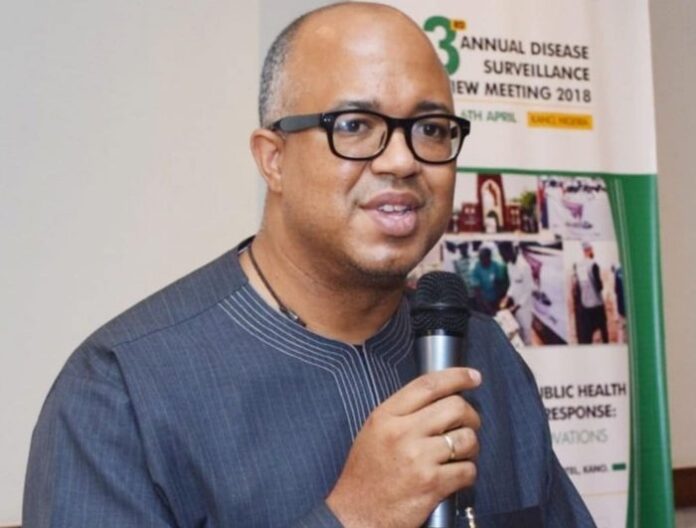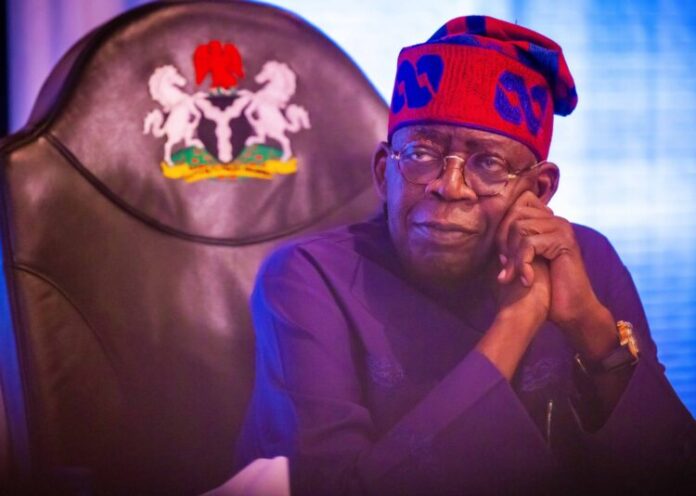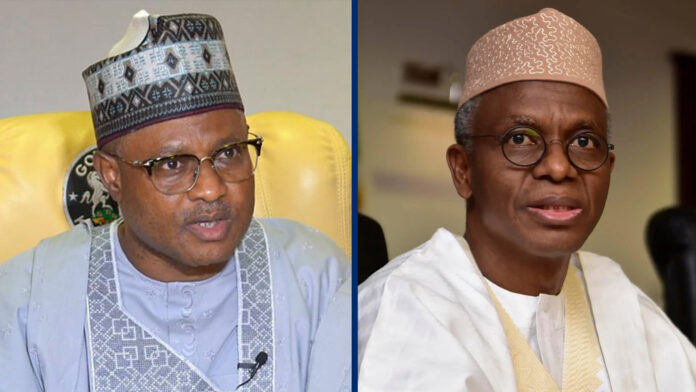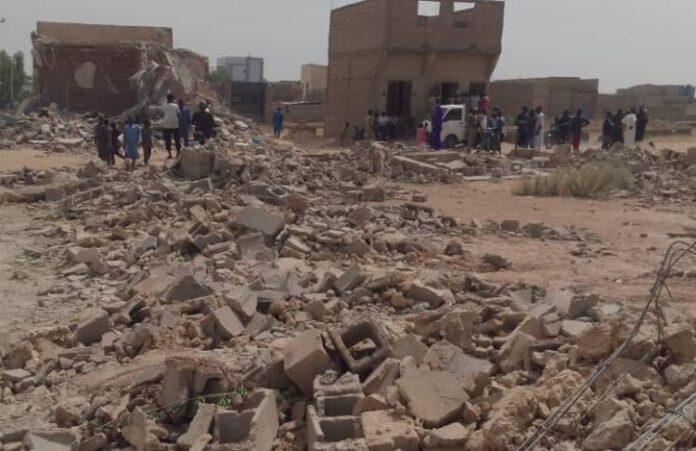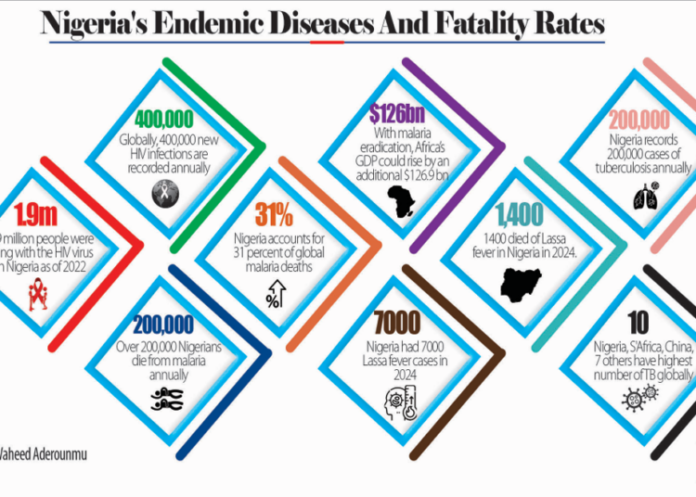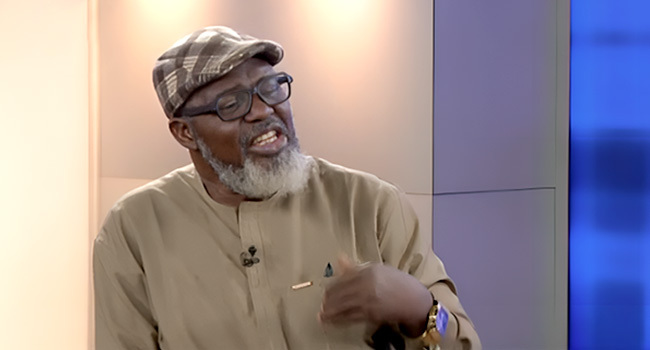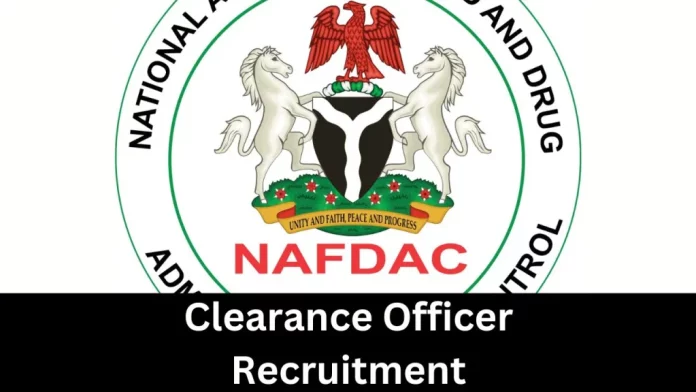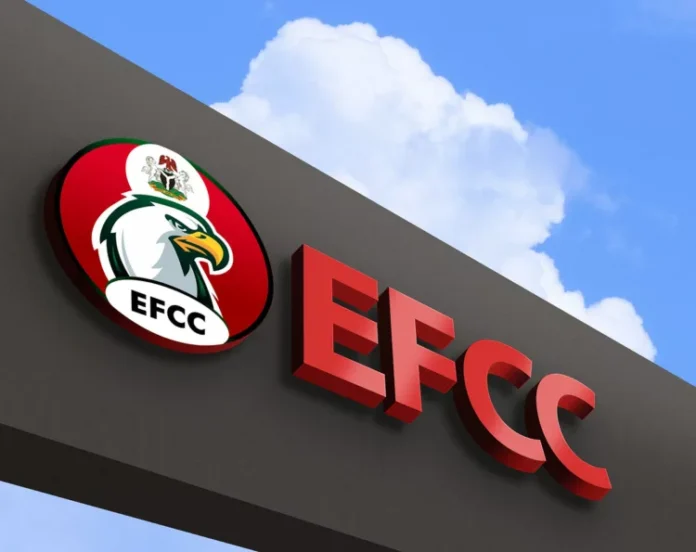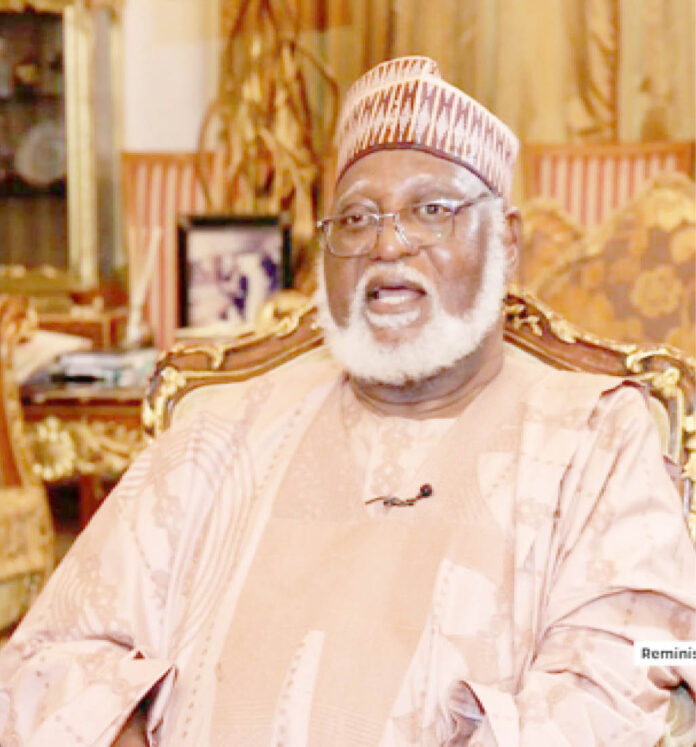Nigeria’s Struggle Against Endemic Diseases: Malaria, HIV/AIDS, Lassa Fever, and Tuberculosis Persist
Nigeria remains far from winning the battle against several deadly diseases that have become endemic, despite ongoing efforts to combat them,leadership reports.
An investigation by LEADERSHIP Weekend revealed that malaria, HIV/AIDS, Lassa fever, and tuberculosis (TB) continue to take a devastating toll, claiming hundreds of thousands of lives annually. Experts cite systemic failures, environmental factors, and gaps in healthcare infrastructure as key reasons for their persistence.
ALSO READ: Ex-Minister: Ignorance behind opposition to Sharia Panels in South-West
Malaria: The Leading Cause of Death
Malaria remains Nigeria’s deadliest disease, with the World Health Organization (WHO) estimating that the country accounts for 31% of global malaria deaths. Annually, over 200,000 Nigerians succumb to the disease.
Despite the availability of insecticide-treated nets and other preventive measures, poor sanitation, stagnant water, and limited access to healthcare services continue to fuel its spread.
A report by Malaria No More UK highlights the economic impact of malaria eradication, estimating that Africa’s GDP could increase by $126.9 billion if the UN achieves its goal of reducing malaria cases by 90% by 2030. This would contribute nearly $16 billion annually to African economies.
HIV/AIDS: A Lingering Public Health Crisis
Nigeria remains the country with the highest HIV burden in West and Central Africa, with approximately 1.9 million people living with the virus as of 2022. Stigma, misinformation, and limited access to healthcare contribute to about 400,000 new infections annually, with nearly 200,000 recorded cases.
Nigeria heavily relies on international support, particularly from the U.S. President’s Emergency Plan for AIDS Relief (PEPFAR), which covers nearly 90% of treatment costs. Concerns arose following a temporary freeze on U.S. foreign aid, but a waiver granted on January 28, 2025, ensured continued funding for lifesaving antiretroviral (ARV) medications.
The Director-General of the National Agency for the Control of AIDS (NACA), Dr. Temitope Ilori, reassured the public that treatment services would continue uninterrupted and urged stakeholders to remain committed to combating the epidemic.
Lassa Fever: A Persistent Threat
Lassa fever remains a major public health concern, with the Nigeria Centre for Disease Control (NCDC) reporting over 7,000 confirmed cases in 2024. The disease has a high fatality rate of approximately 20% and is most prevalent in Edo, Ondo, and Ebonyi states.
Experts warn that weak surveillance systems and inadequate rodent control efforts contribute to the recurring outbreaks.
“We need to strengthen early detection mechanisms and improve community engagement to prevent outbreaks,” health officials advised.
Tuberculosis: A Neglected Epidemic
Nigeria ranks among the top 10 countries globally with the highest TB burden, recording over 200,000 new cases annually. Delayed diagnosis and limited access to treatment contribute to a high mortality rate.
Stakeholders attribute the spread of TB to overcrowded living conditions, poverty, and inadequate healthcare services. While the government has introduced free TB testing and treatment programs, these initiatives are often hindered by insufficient funding and logistical challenges.
Experts Call for Solutions
Health experts agree that stronger policies, increased funding, and greater public awareness are critical in reducing Nigeria’s disease burden and preventing avoidable deaths.
Professor John Oladapo Obafunwa, Director-General of the Nigerian Medical Research Institute (NMRI), emphasized the need for public education and tighter drug regulation.
“People need to be discouraged from buying medications from street vendors and unlicensed chemists,” he warned.
He also highlighted Nigeria’s heavy reliance on international donors, noting that 95% of NMRI’s funding comes from organizations like WHO and the Bill & Melinda Gates Foundation.
“We need increased domestic funding to support research into pressing health challenges,” he added.
Malaria Vaccine Offers Hope
Professor Wellington Oyibo, a medical parasitologist at the University of Lagos, described Nigeria’s malaria mortality rate as the highest in the world.
“Over the past decade, more than 80,000 deaths have been recorded annually due to malaria,” he stated.
However, he expressed optimism about the introduction of malaria vaccines, predicting a significant reduction in fatalities.
“At least four out of ten children will be protected from death, while six out of ten will avoid severe forms of malaria,” he explained.
He urged the private sector to play a more active role in malaria eradication, similar to its involvement in combating COVID-19.
Dr. Michael Charles, CEO of the RBM Partnership to End Malaria, stressed the need for more investment in malaria control efforts.
“Malaria is preventable and treatable, yet it continues to claim lives and hinder economic progress. The investment gap remains a major challenge,” he said.
Environmental and Socioeconomic Challenges
Omolola Lana, Executive Director of the Westfield Development Initiative, pointed out that poverty and environmental conditions significantly contribute to the persistence of these diseases.
“Many Nigerians live in areas with poor sanitation and stagnant water, creating ideal breeding grounds for mosquitoes,” she said.
She also noted that many people fail to use long-lasting insecticidal nets (LLINs) despite their effectiveness.
“To address this challenge, we launched a project where we monitored recipients of LLINs to ensure they used them. Within six months, malaria cases dropped significantly in those communities,” she revealed.
Lana called for more awareness campaigns to promote the use of treated nets and emphasized the need to refocus efforts on malaria eradication following the COVID-19 pandemic.
“Now that we have won the war against COVID-19, it is time to renew the fight against malaria,” she concluded.

